Latin American Women Scholars Find Hope and Opportunity in the Study of the United States Institute on Women’s Leadership
Twice a year, this U.S.-State-Department-funded program invites female college students from across Latin America to tour the United States, learn about its institutions, and develop their leadership skills.
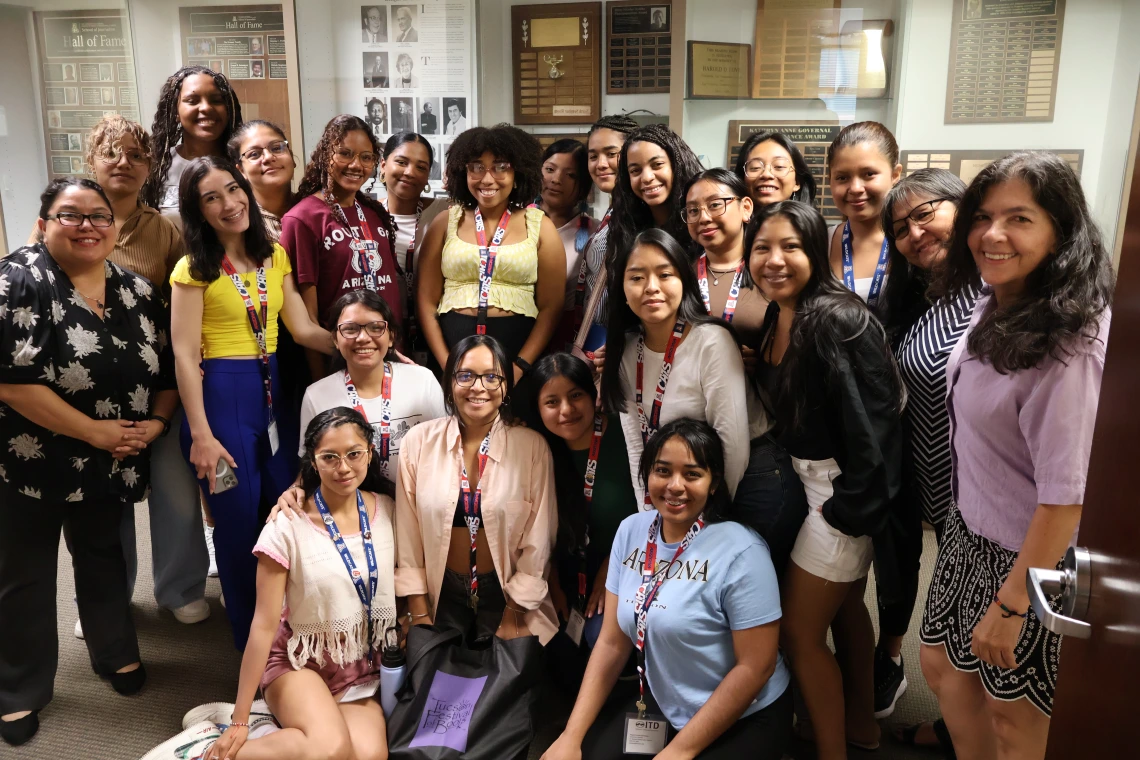
Two white University of Arizona passenger vans pulled into the dirt parking lot of the Tohono O’odham Museum and Cultural Center in Sells, Ariz. – the capital of the Tohono O’odham Nation – on a sweltering summer day.
The space was unusually quiet as nearly two dozen undergraduate college students filed out of the vehicles and made their way to the facility's grandiose entrance in closely grouped clusters of two, three, and four. As locals know well, summer is the slow season in southeastern Arizona. When temperatures start to rise, the population of the Tucson metro area dips dramatically as many of the University’s more-than 50,000 students return home for the season along with the fair-weather residents known as “snowbirds” who call the desert home only during the cooler months. So, today, the group had the museum largely to themselves.
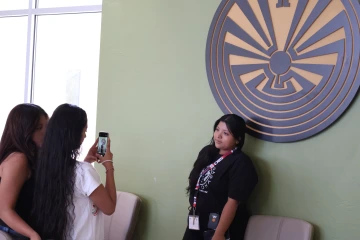
To the average observer, this crew would look more or less like any other cohort of college students in Tucson. Their collective joy was palpable and contagious as they posed for photos next to cultural artifacts while on a private guided tour of the museum – a large metal depiction of the sacred “Man in the Maze” symbol proved to be an especially popular backdrop.
Of course, a closer look at the group would tell a more nuanced story. Most of the students wore blue jeans and t-shirts, but a few sported garments of a more traditional style made of brightly colored fabrics embroidered with elaborate floral designs. One young woman wore a flowing, bright-pink dress and a unique, wide-brimmed straw hat. Another proudly displayed a colorful beaded necklace she made by hand in a style popularized by artisans in her home country of Colombia.
Leadership and Learning Abroad
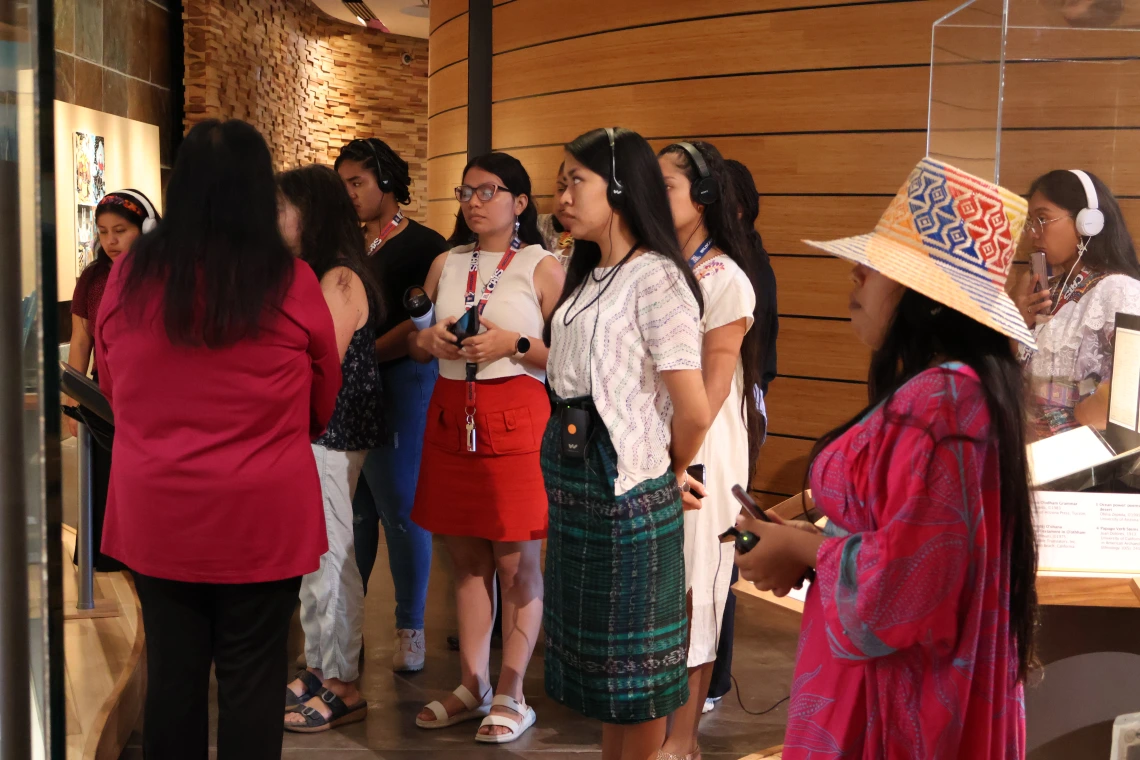
The women on this excursion are not the average University of Arizona undergrads. In fact, they aren’t U of A students at all.
Their time in the U.S. was made possible by a competitive cultural immersion program called Study of the United States Institute (SUSI), which is funded by the U.S. State Department and run by the U of A Center for Latin American Studies (CLAS) under the direction of Dr. Marcela Vásquez-León, CLAS’ director and Professor in the School of Anthropology. The SUSI Women’s Leadership Institute is part of a larger partnership organized by the nonprofit Institute for Training and Development in Amherst, Mass.
SUSI programs are available to citizens of dozens of countries around the world via the U.S. Embassies in those countries, and versions exist which cater to undergraduate students, graduate students, and secondary educators. The program involves taking a six-week trip to the U.S. to engage with various institutions of government and higher education while also participating in lectures, professional development workshops, and tours of multiple large cities on the east coast like Boston, New York City, and Washington D.C. The U of A Native Nations Institute plays a key role in delivering core educational content about Native Nation Building to SUSI students during their time in Tucson.
The U of A has been an important player in the SUSI program for Latin American undergraduates since it began as a co-ed experience managed by a professor in the Department of Education in 2008. Vásquez-León came on board as co-Principal Investigator of the program in 2009, in partnership with Professor Alberto Arenas from the College of Education, and has been running it on her own since 2016.
From its inception, the program has stood out as the only one conducted entirely in Spanish and designed specifically for Indigenous students—rather than restricting participation to those fluent in English, as all other SUSI programs do, or prioritizing students with greater access to international educational opportunities. The program underwent several key changes when Vásquez-León took over. As a native of Colombia, the U of A Professor and program lead determined that her iteration of the SUSI program would be more impactful if it specifically focused on women student leaders who identify and come from both Indigenous and Black communities from eight different Latin American countries.
“Not only are they women but, as Indigenous and Afro women, they have all experienced a lot of racism and discrimination in their lives,” says Vásquez-León. “For me, the most important thing… is that we’re offering a space where these women… are free for the first time ever to say whatever they want,” she says, “Where they are not under any patriarchal structure that is going to try to shut them up, and where they encounter other women leaders from different countries.”
Opportunity and Networking
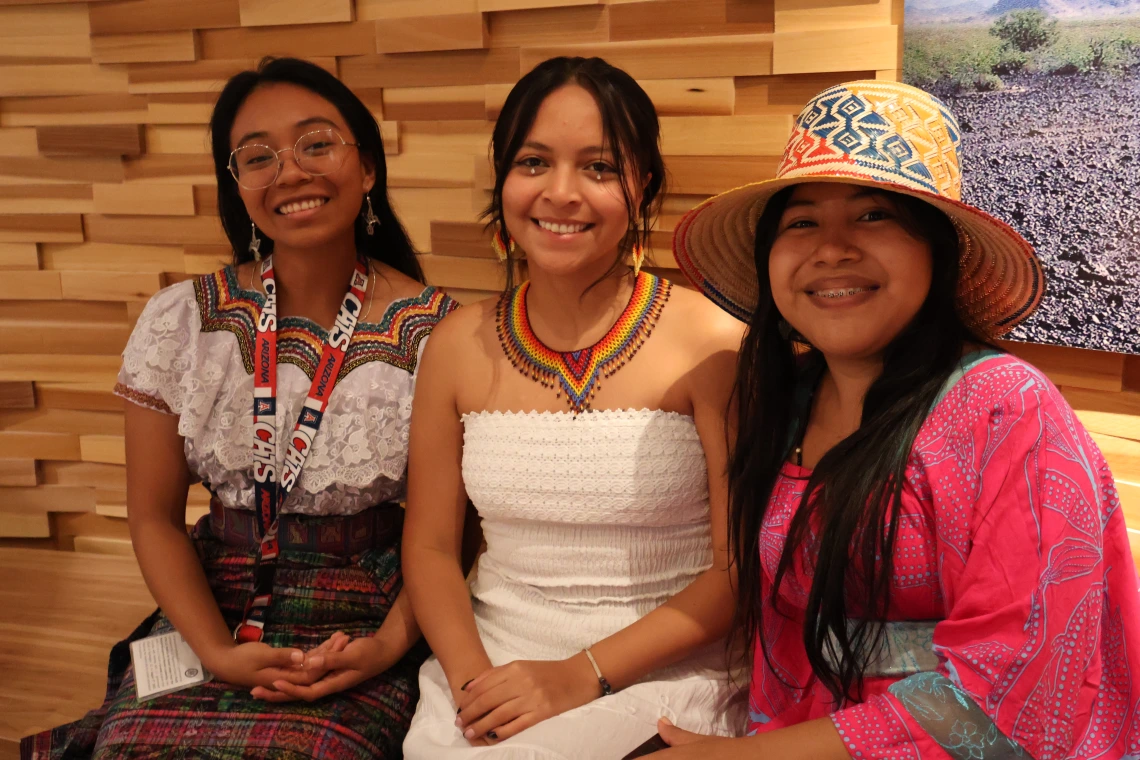
From left: Job’ Kotz'ij Rodriguez Alonso (Guatemala), Angela Dayana Córdoba Jiménez (Colombia), and Maxiolis Yulieth Bonivento Ponce (Colombia) at the Tohono O'odham Museum and Cultural Center.
Job’ Kotz’ij Rodriguez Alonso is a Maya Kaqchikel woman from Guatemala who was part of the 2025 summer SUSI tour. Despite growing up poor and dealing with a lifetime of being told she was less-than because of her gender and ethnicity, Rodriguez Alonso says that her upbringing has instilled in her a strong sense of responsibility and love for her community.
“In Guatemala there’s a saying,” says Rodriguez Alonso, “the worst thing to be in society is a poor Indigenous woman.” Still, she says she refuses to let society’s invisible barriers prevent her from having a positive impact on her home. “In my family, we’re taught that everything we do is for the community,” says Rodriguez. “If you’re doing well, you share that with your people. With passion and love, you can overcome barriers and do something big.”
The women selected to participate in the program were chosen because they have demonstrated academic prowess in their home institutions as well as leadership in some capacity related to serving their communities at home.
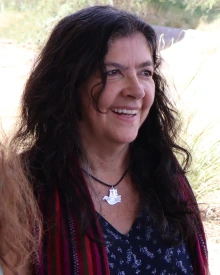
Marcela Vásquez-León
“They already come with a sense of leadership,” says Vásquez-León, “so, even when people tell them that they cannot do certain things, there’s something in them that knows they are different.”
Colombian Maxiolis Yulieth Bonivento Ponce (Wayuu) hopes to start a craft exchange to help artisans from all over Latin America find international markets for their goods. She says that leadership training isn’t common in her community, but her time in the SUSI program has helped her develop a network of contacts and given her the confidence she needs to pursue her goals. “As a woman and a professional, I’ve taken a big step,” says Bonivento Ponce, “and I’ll bring what I’ve learned back to my community.”
Guatemalan Sheyla Micaela Sharon Lux Joj (Maya K’iche’) is similarly thrilled by the chance to learn and expand her opportunities alongside a peer cohort. She says that programs like SUSI are important because so few spaces exist to provide opportunities specifically to young female Latin American leaders. She also sees the potential for enhanced impact due to the growth of her network.
"This is a place where we can strengthen our leadership and adopt new methodologies,” says Lux Joj, “and (it’s valuable) for the world because we become agents of change. Everything we learn here, we bring back to our communities. Since we’re from different countries, a huge community benefits.”
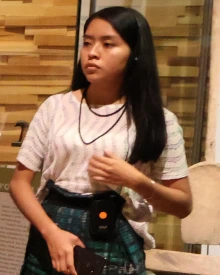
Sheyla Micaela Sharon Lux Joj (Guatemala)
According to Vásquez-León, the SUSI trip is the first opportunity for most of these young scholars to travel abroad and learn with a group of other women leaders who, through most of their lives, also experience intersectional discrimination based on gender, class, race, and ethnicity. The program opens doors at many levels, and it is for this reason she says that the overwhelmingly positive response to the program keeps her motivated to run two versions of it year after year. Today there is a network of alumni of the program of more than 400 women from more than eight Latin American countries.
“When they come here… they find a space where they learn how to defend their ideas, where they empower themselves, and clarify who they are,” says Vásquez-León. “For me, that's the motivation – to see these women who have drive being acknowledged, respected, pushed, and realizing that they are not alone.”
Though the lasting repercussions of SUSI might seem small to someone looking in from the outside, to the young women selected to participate in the program, it’s life changing. “We’ll never forget this experience,” says Bonivento Ponce, “it’s something we’ll tell our grandchildren about.”
And that’s an impact worth celebrating.
Académicas latinoamericanas encuentran esperanza y oportunidades en el Instituto de Estudio de los Estados Unidos sobre Liderazgo Femenino
Dos veces al año, este programa financiado por el Departamento de Estado de EE. UU. invita a estudiantes universitarias de toda América Latina a recorrer Estados Unidos, conocer sus instituciones y desarrollar sus habilidades de liderazgo.
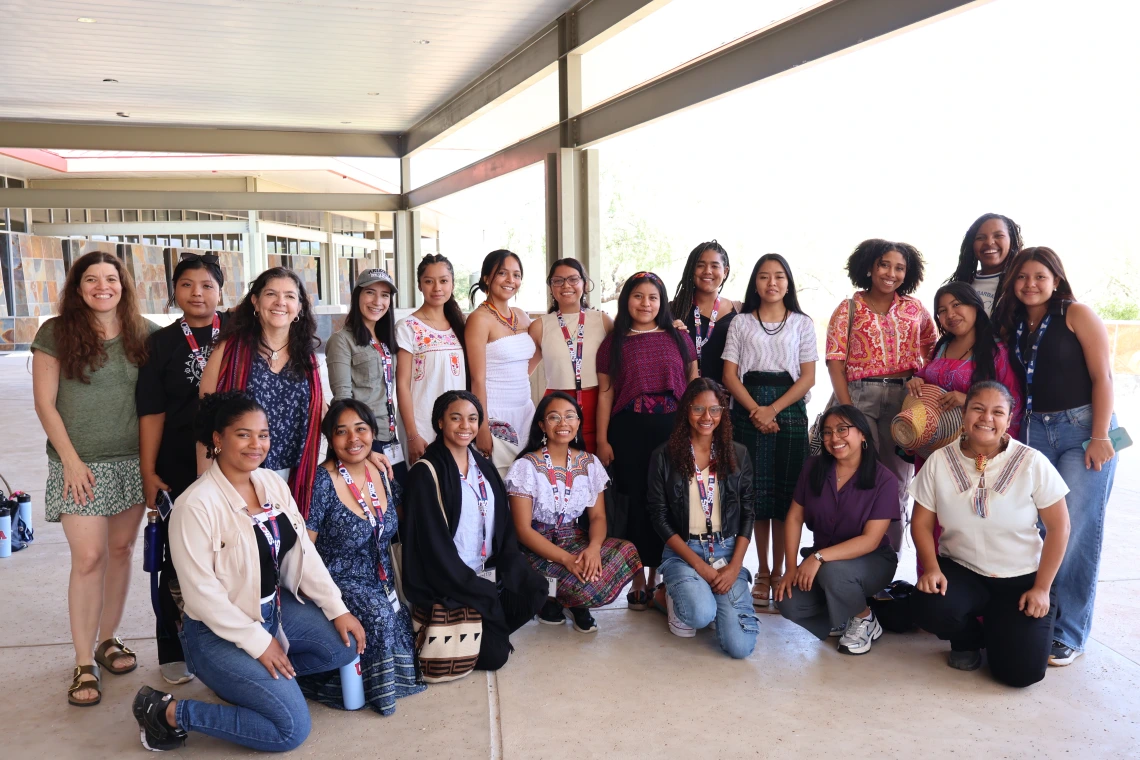
En un caluroso día de verano, dos camionetas blancas de pasajeros de la Universidad de Arizona se detuvieron en el estacionamiento sin pavimentar del Museo y Centro Cultural Tohono O’odham en Sells, Arizona, capital de la Nación Tohono O’odham.
El lugar estaba inusualmente tranquilo mientras casi dos docenas de estudiantes universitarias descendían de los vehículos y se dirigían a la entrada majestuosa del edificio en pequeños grupos de dos, tres o cuatro. Como bien saben los locales, el verano es temporada baja en el sureste de Arizona. Cuando las temperaturas comienzan a subir, la población del área metropolitana de Tucson disminuye drásticamente: muchos de los más de 50,000 estudiantes de la Universidad regresan a casa junto con los residentes temporales conocidos como “snowbirds”, que habitan el desierto solo durante los meses frescos. Así que, ese día, el grupo prácticamente tenía el museo para sí.
Para un observador casual, este grupo parecería una cohorte cualquiera de universitarias de
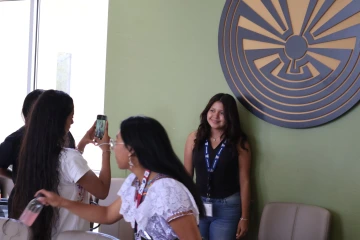
Tucson. Su alegría colectiva era palpable y contagiosa mientras posaban para fotos junto a artefactos culturales durante una visita guiada privada por el museo. Una gran representación metálica del símbolo sagrado “El hombre en el laberinto” resultó ser un fondo especialmente popular para las fotografías.
Por supuesto, una mirada más cercana revelaría una historia más matizada. La mayoría de las jóvenes vestían jeans y camisetas, pero algunas lucían prendas de estilo más tradicional, confeccionadas con telas de colores vivos y bordadas con elaborados diseños florales. Una joven llevaba un vestido fluido de color rosa brillante y un sombrero de paja de ala ancha y forma única. Otra lucía con orgullo un colorido collar de cuentas que había elaborado a mano, en un estilo popularizado por las artesanas de su país natal, Colombia.
Liderazgo y aprendizaje en el extranjero
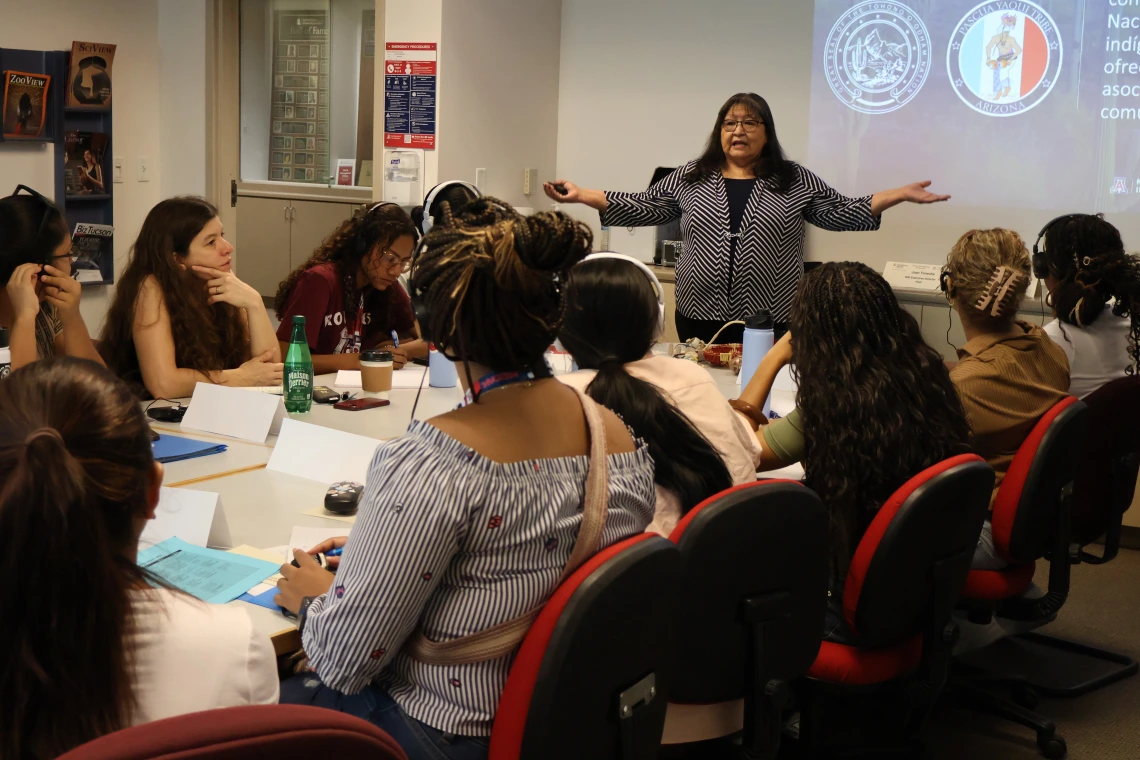
Las mujeres en esta excursión no son las típicas estudiantes de la Universidad de Arizona. De hecho, no son estudiantes de la UA.
Su estancia en Estados Unidos fue posible gracias a un competitivo programa de inmersión cultural llamado Study of the United States Institute (SUSI), financiado por el Departamento de Estado de EE. UU. y administrado por el Centro de Estudios Latinoamericanos (CLAS) de la Universidad de Arizona bajo la dirección de la Dra. Marcela Vásquez-León, directora del CLAS y profesora en la Escuela de Antropología. El Instituto de Liderazgo Femenino SUSI forma parte de una colaboración más amplia liderada por la organización sin fines de lucro el Institute for Training and Development en Amherst, Massachusetts.
Los programas SUSI están disponibles para ciudadanos de decenas de países a través de las embajadas de EE. UU., y existen versiones dirigidas a estudiantes de licenciatura, posgrado y a docentes de nivel medio. El programa consiste en un viaje de seis semanas por Estados Unidos para interactuar con diversas instituciones gubernamentales y de educación superior, participar en conferencias, talleres de desarrollo profesional y recorridos por varias ciudades grandes de la costa este como Boston, Nueva York y Washington D. C. El Native Nations Institute de la Universidad de Arizona desempeña un papel clave al impartir contenido educativo sobre la construcción de naciones indígenas a las estudiantes de SUSI durante su estancia en Tucson.
La Universidad de Arizona ha desempeñado un papel fundamental en el programa SUSI para estudiantes latinoamericanas desde que comenzó como una experiencia mixta dirigida por un profesor del Departamento de Educación en 2008. Vásquez-León se unió como co-investigadora principal en 2009, junto con el profesor Alberto Arenas del College of Education, y desde 2016 dirige el programa por su cuenta.
Desde su inicio, el programa se ha destacado por ser el único realizado completamente en español y diseñado específicamente para estudiantes indígenas, en lugar de limitar la participación a quienes dominan el inglés, como hacen todos los demás programas SUSI, o priorizar a estudiantes con mayor acceso a oportunidades educativas internacionales. El programa experimentó varios cambios importantes cuando Vásquez-León asumió la dirección. Como colombiana, la profesora de la Universidad de Arizona determinó que su versión del programa tendría un mayor impacto si se enfocaba específicamente en mujeres líderes estudiantiles que se identifican y provienen de comunidades indígenas y afrodescendientes de ocho países latinoamericanos.
“No solo son mujeres, sino que, como mujeres indígenas y afro, todas han experimentado mucho racismo y discriminación en sus vidas”, dice Vásquez-León. “Para mí, lo más importante… es que les estamos ofreciendo un espacio donde estas mujeres… son libres por primera vez de decir lo que quieran,” afirma, “donde no están bajo ninguna estructura patriarcal que las intente silenciar, y donde pueden encontrarse con otras mujeres líderes de distintos países.”
Oportunidad y redes de apoyo
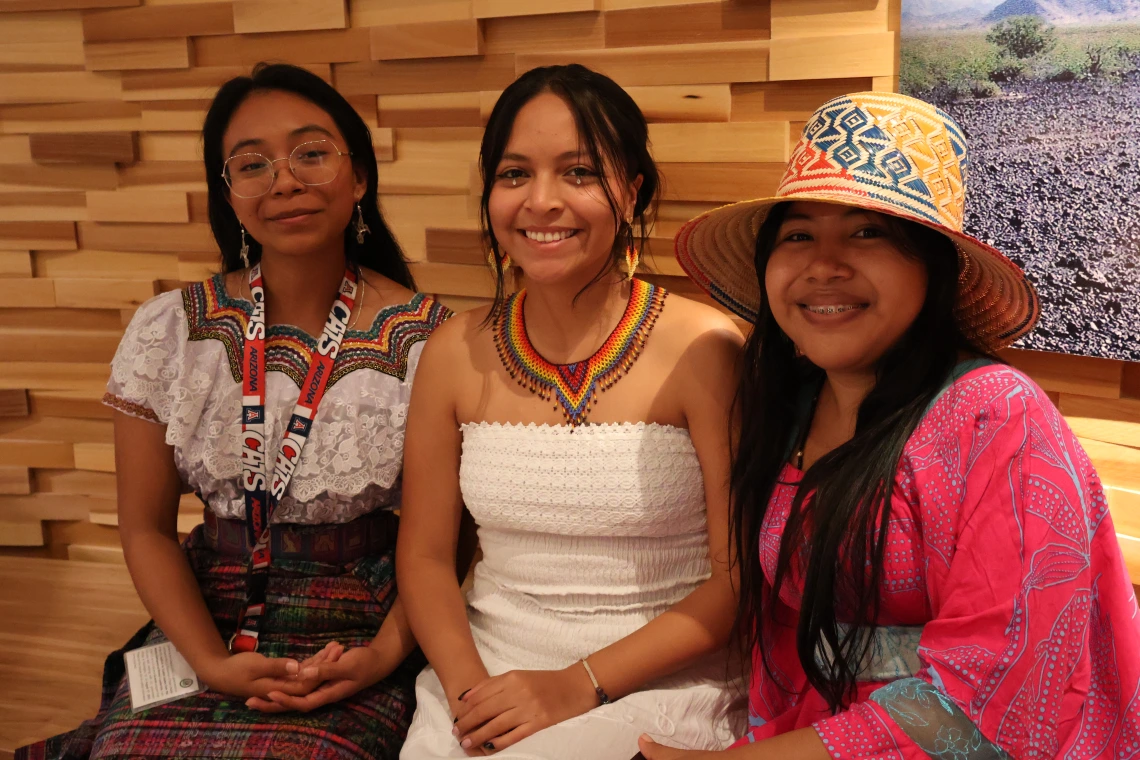
Desde la izquierda: Job’ Kotz'ij Rodriguez Alonso (Guatemala), Angela Dayana Córdoba Jiménez (Colombia), y Maxiolis Yulieth Bonivento Ponce (Colombia).
Job’ Kotz’ij Rodríguez Alonso es una mujer maya kaqchikel de Guatemala que participó en la edición de verano 2025 del programa SUSI. A pesar de haber crecido en la pobreza y de haber escuchado toda su vida que valía menos por su género y etnicidad, Rodríguez Alonso dice que su crianza le inculcó un fuerte sentido de responsabilidad y amor por su comunidad.
“En Guatemala hay un dicho,” dice Rodríguez Alonso, “lo peor que se puede ser en la sociedad es una mujer indígena pobre.” Aun así, afirma que se niega a dejar que las barreras invisibles de la sociedad le impidan tener un impacto positivo en su hogar. “En mi familia, nos enseñan que todo lo que hacemos es por la comunidad,” dice Rodríguez. “Si te va bien, compartes eso con tu gente. Con pasión y amor, puedes superar barreras y hacer algo grande.”

Marcela Vásquez-León
Las mujeres seleccionadas para participar en el programa fueron elegidas porque demostraron excelencia académica en sus instituciones de origen, así como liderazgo en actividades relacionadas con el servicio a sus comunidades.
“Ellas ya vienen con un sentido de liderazgo,” dice Vásquez-León, “así que, incluso cuando la gente les dice que no pueden hacer ciertas cosas, hay algo en ellas que sabe que son diferentes.”
La colombiana Maxiolis Yulieth Bonivento Ponce (Wayuu) espera crear un intercambio artesanal para ayudar a artesanas de toda América Latina a encontrar mercados internacionales para sus productos. Dice que el entrenamiento en liderazgo no es común en su comunidad, pero su tiempo en el programa SUSI le ha permitido desarrollar una red de contactos y le ha dado la confianza necesaria para perseguir sus metas. “Como mujer y como profesional, he dado un gran paso,” dice Bonivento Ponce, “y llevaré lo que he aprendido de regreso a mi comunidad.”
La guatemalteca Sheyla Micaela Sharon Lux Joj (maya k’iche’) está igualmente entusiasmada por la oportunidad de aprender y ampliar sus horizontes junto a sus compañeras. Afirma que programas como SUSI son importantes porque existen muy pocos espacios que brinden oportunidades específicamente a jóvenes líderes latinoamericanas. También ve el potencial de un impacto multiplicador gracias al crecimiento de su red.
“Este es un lugar donde podemos fortalecer nuestro liderazgo y adoptar nuevas metodologías,” dice Lux Joj, “y (es valioso) para el mundo, porque nos convertimos en agentes de cambio. Todo lo que aprendemos aquí, lo llevamos de regreso a nuestras comunidades. Como somos de diferentes países, una enorme comunidad se beneficia.”
Según Vásquez-León, el viaje SUSI representa la primera oportunidad para la mayoría de estas

Sheyla Micaela Sharon Lux Joj (Guatemala)
jóvenes académicas de viajar al extranjero y aprender junto a otras mujeres líderes que, al igual que ellas, han experimentado discriminación interseccional por razones de género, clase, raza y etnicidad. El programa abre puertas en muchos niveles, y por ello afirma que la respuesta abrumadoramente positiva la motiva a organizar dos ediciones cada año. Actualmente existe una red de más de 400 exalumnas del programa provenientes de mas que ocho países latinoamericanos.
“Cuando vienen aquí… encuentran un espacio donde aprenden a defender sus ideas, donde se empoderan y aclaran quiénes son,” dice Vásquez-León. “Para mí, esa es la motivación: ver a estas mujeres con impulso ser reconocidas, respetadas, impulsadas, y darse cuenta de que no están solas.”
Aunque las repercusiones del programa SUSI puedan parecer pequeñas para un observador externo, para las jóvenes seleccionadas, es una experiencia que les cambia la vida. “Nunca olvidaremos esta experiencia,” dice Bonivento Ponce, “es algo de lo que les hablaremos a nuestros nietos.”
Y ese es un impacto que vale la pena celebrar.

